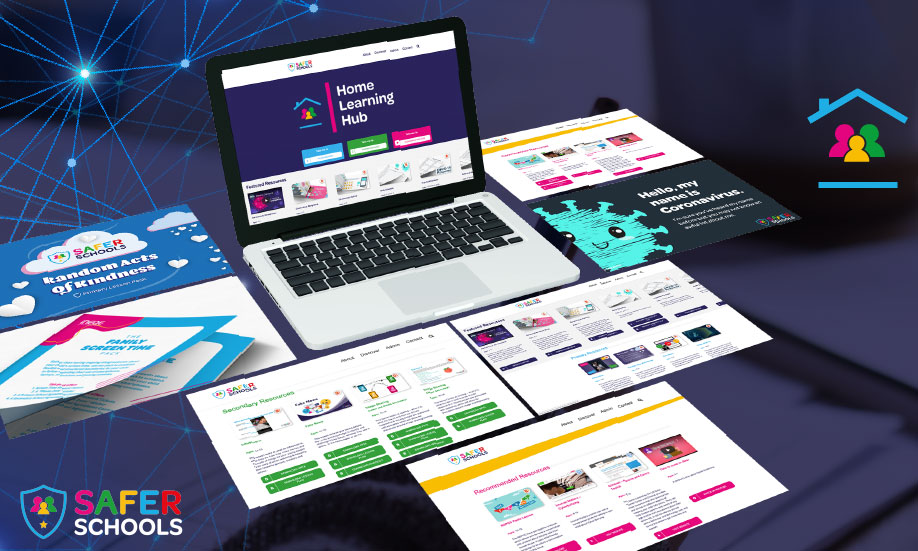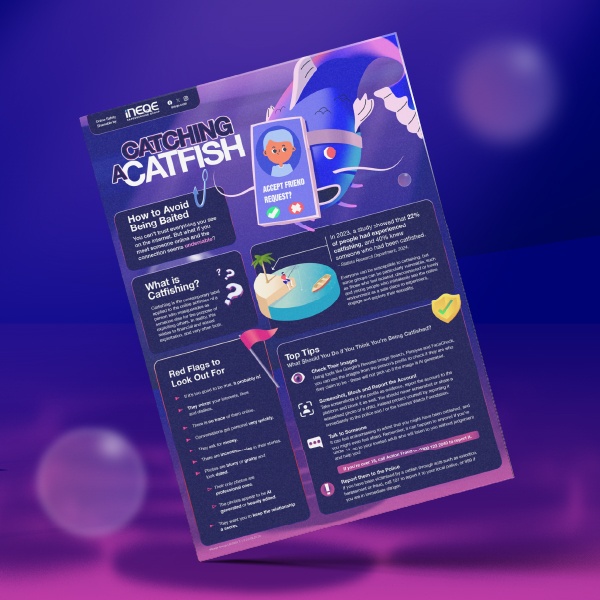Last Updated on 25th June 2024
Read the script below
Hannah: Hello and welcome to another edition of Safeguarding Soundbites. This is the go-to podcast for getting up-to-date news and alerts about all things safeguarding.
Colin: It is indeed. And I’d like to take a moment to welcome you to the podcast, Hannah!
Hannah: Thanks, Colin – happy to be here. I’ve got the latest in social media news all ready to go. Shall I kick us off?
Colin: Absolutely! We’ll also be talking about…But let’s dive in to social media. Hannah?
Hannah: Okay, first up, the Technology Secretary Michelle Donelan has said she’ll be taking a zero-tolerance stance when it comes to social media firms enabling under 13-year-olds to use their platform. Platforms like Instagram, TikTok and Snapchat are all supposed to be for users 13 and older but, under the upcoming Online Safety Bill, if users younger than this are found on the platform, the companies could face fines and criminal liability.
Colin: Did she say anything about how much the fines might be?
Hannah: Yes, the fines would be 10% of the companies’ annual turnover.
Colin: So not insignificant.
Hannah: No. And it’s also going to carry an up-to-two-year prison sentence.
Colin: Which shows how seriously this is being taken.
Hannah: Exactly. But as the Secretary rightly pointed out, for children under 13, there can be a mental health toll and further ramifications to them accessing social media sites.
Colin: That age restriction is there for a reason. There can be content on there that would be harmful for a child to see.
Hannah: Yes, and I know that some of these social media platforms have introduced or are going to introduce age verification methods, like video age verification. It’s just about making that process as effective and reliable as possible, and hopefully these new possible consequences will inspire social media platforms to tighten up their age verification measures.
Colin: Long overdue, really.
Hannah: Yes, one example of how social media companies might be taking further steps in response to this can actually be seen with Snapchat’s announcement of new ‘safety enhancements for young users’.
Colin: Ah yes, I saw this! Some of these enhancements are things like warning labels on accounts seeking to connect with teenaged users they do not know, a new ‘strike system’ for accounts that promote inappropriate content, and some new ‘Snapchat Safeguards’ content that will help parents, carers, and young people to understand the risks of online connection.
Hannah: That sounds like quite a lot of good steps in the right direction!
Colin: It does. Our researchers are looking into these proposed features as we speak, so we’ll be able to give you more information soon!
Hannah: We also have an alert for our listeners today. There’s been reports of a new TikTok trend that involves participants challenging each other to inhale toxic fumes.
Colin: Oh, that’s so dangerous.
Hannah: It is. We’re talking about inhaling deodorants and other aerosol cans. Of course, a lot of young people might not understand the risks of doing this but there can be serious medical side effects, such as seizures and even heart attacks.
Colin: Young people might just see it as fun. They see other people doing it on TikTok and think they’ve been fine, so how dangerous could it be?
Hannah: Which is really a good summary of how all of these types of social media challenges work. But we know that young people can also feel pressured by their friends to take part, or they see other people getting lots of engagement and popularity by uploading this type of content.
Colin: All really standard thought processes and reactions for young people – who simply want to fit in, you want people to like you, and this means you can be susceptible to peer pressure.
Hannah: This is why it’s really important that parents, carers, teachers, and anyone who plays a trusted role in a young person’s life take the time to understand what these challenges are, why a young person might participate, and what they can do to mitigate the risks. For example, have a conversation with that child about their online habits. You don’t need to bring up specific challenges or challenges at all.
Colin: You don’t want to risk drawing their attention to it if they weren’t aware in the first place!
Hannah: Yes – just talk about what they do online, what apps do they use, what type of content do they like to watch. And if they approach you about online challenges, then you can talk about that. Ask what they know about them – do they think they can be dangerous? Have they ever felt pressured to take part, or seen someone being pressured to take part?
Colin: Really great conversation points. We also have our guide to responding to online challenges and hoaxes, which contains lots more information and advice.
Hannah: That can be found on our website ineqe.com. Just search for ‘responding to online challenges’.
Colin: Thank you Hannah for our social media news and that really important alert. Moving on now to another warning of sorts! The National Cyber Security Centre has warned schools to be wary of cyberattack threats as the new school year begins. They have said that there is typically no indication of an incoming attack, but this time of year can create vulnerabilities due to things like accounts being created on devices for new staff and pupils. Also, I imagine just the general chaos, I suppose, of giving out new devices and everyone learning how everything works.
Hannah: You could see how all the cyber security measures get overlooked or forgotten.
Colin: And cyber criminals are probably very aware of that, which is why it’s so important to that schools are extra careful now – and even parents and carers, if pupils are bringing those devices home.
Hannah: Could you give us a really quick rundown of some the things we should be doing, Colin?
Colin: Quick? Is this boring to you, Hannah?
Hannah: No, I’m all about the cyber security! I just don’t want to overwhelm our listeners.
Colin: Overwhelm them with excitement?
Hannah: I wouldn’t go that far! But go on, you could have been done by now…
Colin: I don’t think we’ll have you back on the podcast, you’re rushing me! But that actually is a good first point – there’s no short cut to being cyber secure!
Hannah: See, I’m helpful!
Colin: Okay, you can come back. But yes, people sometimes think that doing things like ensuring your firewall and anti-virus software is on and working, choosing a strong password, and taking cyber security training might be, well, boring. But it can be a lot more boring, and frustrating, if you’re trying to fix the fallout of a cyber security attack! So do those things and get into good cyber security habits from the start of the new school year.
Hannah: You can also find loads of cyber security tips and information on our website and on our Safeguarding Apps.
Colin: You can!
Colin: Now to shocking new figures that have been released by the NSPCC showing that Scotland is facing extreme levels of online child abuse. The charity is urging politicians to take action now as young people cannot wait any longer for the Online Safety Bill. Since the government started discussing the bill, 3,500 online grooming crimes have been recorded by Police Scotland, with over 1850 of those against primary aged children. The NSPCC says that the design features of popular platforms are being taken advantage of to abuse children.
Hannah: Really shocking numbers, Colin. I know you’ve discussed the Online Safety Bill before on this podcast and that we have a guide to the bill on ineqe.com, but where is the bill now?
Colin: The bill, which is going to put the responsibility on social media and other online tech companies to protect children using their platforms, is currently in its third reading in the House of Lords. Its due to put forward for final approval next month.
Hannah: Okay. So it’s been a slow process.
Colin: It has. We’ve been watching this bill in all its forms for…many years.
Hannah: Well, as we see in Scotland, when it comes to keeping children and young people safe online, many years is…many years too many. Safeguarding involves taking action now – action taken tomorrow doesn’t help those who need it today.
Colin: Very true. Okay, let’s finish today’s podcast with some positivity.
Hannah: Is it time for our safeguarding success story of the week?
Colin: It is!
Hannah: Fab.
Colin: So this is news that actually came out over the summer while we were on a break, but it’s a goodie.
Hannah: An oldie but a goodie?
Colin: An oldie but a goodie! And don’t you say, ‘like me’!
Hannah: I wasn’t going to! You’re telling on yourself there, Colin.
Colin: Well the story definitely isn’t as old as me anyway! But guidelines have been proposed for restricting the use of loot boxes in gaming in the UK. They’ve been put forward to help protect children and young people, but I think they will also have a wider, positive effect on gaming.
Hannah: Loot boxes are the treasure-chest like items players can buy in games. Essentially, you don’t know what’s going to be in it until after you buy it.
Colin: Yes, and it could be something worth a lot within the game or it could be something mundane.
Hannah: Hmm, I see where the concern is there.
Colin: It’s gambling-like.
Hannah: Gambling adjacent?
Colin: Some might just say gambling! These new guidelines would mean if loot boxes are available in a game, there must be clear information given about probabilities. The process of loot boxes must also be easily understandable, and all players should be given protections and lenient refund policies.
Hannah: And is this something that’s actually going to happen?
Colin: This has been agreed upon across the games industry in the UK, through working groups and in conjunction with the government too. So, yes!
Hannah: Brilliant.
Colin: Well, all that is left is to say thank you to our listeners, and to let you know that you can sign up to our safeguarding hub at our website ineqe.com.
Hannah: You can also follow us on social media by searching for Ineqe Safeguarding Group or Safer Schools. Thanks for tuning in!
Colin: And as always…
Both: Stay safe!
Join our Online Safeguarding Hub Newsletter Network
Members of our network receive weekly updates on the trends, risks and threats to children and young people online.
Pause, Think
and Plan
Guidance on how to talk to the children in your care about online risks.

Visit the Home Learning Hub!
The Home Learning Hub is our free library of resources to support parents and carers who are taking the time to help their children be safer online.








